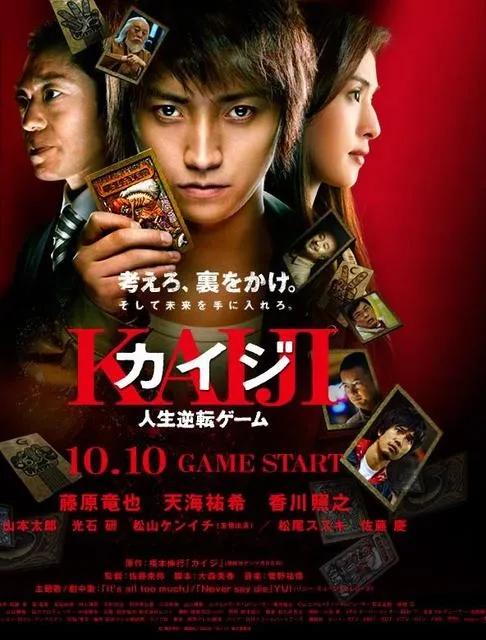Japan is accustomed to producing inspirational anime, and its themes involve all levels of society and industries, which can be described as all-encompassing.
When I watched the trilogy of live-action films "Gambling Apocalypse", I admired Japan's ability to reveal a subtle philosophy of life through the traditional concept of gambling, which shows that the Japanese, who may be limited by geocultural constraints and are generally stereotyped and depressed, do have more imagination than the Chinese.
Praise for the ability of other countries to weave stories also means regret the lack of creativity in their own countries. Our film and television works always seem to like to be rigid, such as the remake of "Langya Relief Grocery Store" and "The Dedication of Suspect X". Please forgive my bluntness, that domestic work that imitates "Gambling Apocalypse" really lacks any novelty in plot setting or connotation mining.
Returning to the original, let's take a look at what Gambling Apocalypse actually says. First of all, the work undoubtedly alludes to the clear distinction between the upper and lower classes of Japanese society. The upper classes, who wield power and wealth, existed on their toes, and they were superficially humble and polite, but in their bones they were disdainful and contemptuous of the poor. The difference between people is money, and no money corresponds to garbage, incompetence, depravity or failure, and the poor people living at the bottom of society only have the so-called human rights at the legal level, while in real life, human rights are like a useless piece of paper, kneaded, trampled, torn or abandoned.
The protagonist, Kaiji Ito, is a downright poor man who has no skills, does nothing in his work, and owes a huge debt for guaranteeing for others. In order to change the status quo, Kaiji can only gamble, so he easily enters the gambling game set up by the rich, which is the beginning of many tragic stories in reality. The greed and deception of the gamblers make Kaiji gradually enlightened, and he finally wins the game with the aura of the protagonist, but decides to stay and start a dark debt repayment career out of commitment to his companions, which is one of the most puzzling of the many reversals in "Gambling Apocalypse". Why Kaiji was able to start over but chose to work hard, I thought about it for half a day, but it can only be reduced to a greater test if he wants to receive a better gift from God.
The challenge of the high-altitude canoe bridge made me look at it with cold hair and trepidation. This life and death gamble should be the bridge section in the entire trilogy that can make the audience feel the cruelty of gambling. Challengers have to face both psychological fears and climatic obstacles, and the chances of passing the level are almost zero. What's more, the failure of others will seriously increase the interference with the grasp of his own balance, but Kaiji has done it, and he can only rely on perseverance and confidence.
Ordinary inspirational films end here, but "Gambling Apocalypse" is to carry out the test to the end. Kaiji relies on ingenuity and judgment to defeat the leader of the evil forces (the DiAi Group), but is taken all the money by another Di Ai employee who works with him, and the penniless Kaiji has to participate in the next gamble again in order to survive and change. Ironically, such a cycle unfolds over and over again: penniless, seeing opportunities, finding companions, making plans, participating in gambling, life hanging in the balance, miracle reversal, winning, money-wrenching, complacent, finding cheated, penniless... This is the trajectory of Kaiji's life, and perhaps, the path that others have taken or are taking.
The essence of gambling in "Gambling Apocalypse" is the confrontation of classes, the contest of black and white, the revelation of human nature, and the game of good and evil. The critique of bizarre distortions and the squeezing of the hammer bone is left to the Taoists, and I believe that the ideas, tricks, or means presented in the whole series to achieve the end have been used by each of us. There is nothing to be ashamed of, it is due to real human nature.
If I had to say what kind of inspiration the film gave me, I would be silent. Because, since it is an inspiration, let's go to the movie and understand it ourselves.
